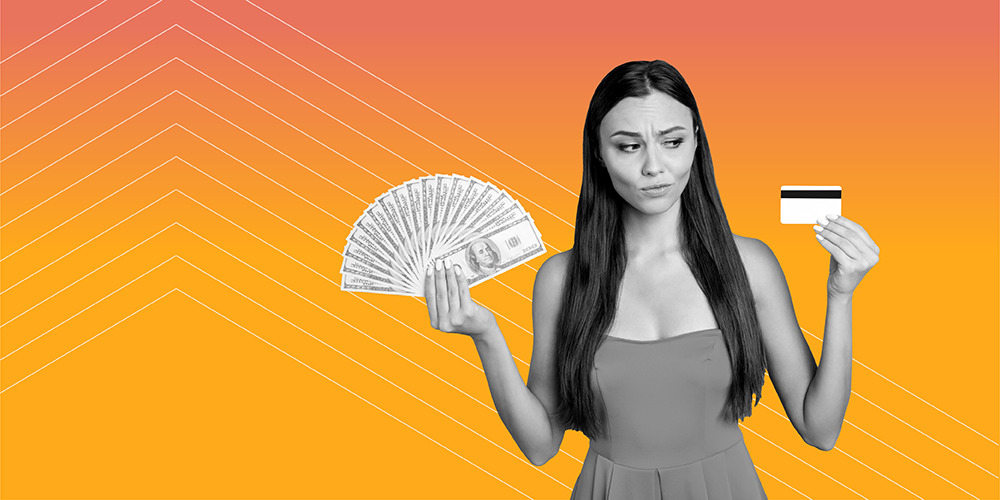Choosing Between a Personal Loan and Credit Card

Borrowing money with a personal loan or credit card are two options for covering an unexpected expense.
Credit cards are a type of revolving credit where a credit limit determines the maximum amount a borrower can use repeatedly. Personal loans are a type of installment credit where borrowers are given the full loan amount upfront and then make regular payments until the debt and interest are fully repaid.
Deciding to use a personal loan or credit card will vary based on the needs of the borrower. Interest rates for personal loans and credit cards depend on the creditworthiness of the borrower. Borrowers with excellent credit scores may qualify for lower interest rates compared to borrowers with poor credit scores who may have to pay higher interest rates.
Personal loans and credit cards are both unsecured types of credit, but they have some key differences.
What is a personal loan?
A personal loan can give you the money you need in a lump sum. The loan is repaid in fixed installment payments over a set period of time. Personal loans commonly have fixed interest rates and a set payment schedule, so you know how much it will cost to pay off the loan. Borrowers are required to repay interest, the loan amount, and any other fees associated with the loan.
Borrowers can get personal loans from credit unions, banks, and online lenders. Interest rates will vary depending on factors such as a borrower’s credit score.
Common types of personal loans:
Installment loans
While a personal loan is considered a type of installment loan, “installment loans” is a broad term. Borrowers may encounter installment loans through mortgages, auto loans, and student loans.
Bad credit loans
Bad credit loans may be a good option for people with low credit scores who may not qualify for a traditional personal loan. Bad credit loans function like personal loans in the way borrowers repay the loan over a fixed period and payment schedule. However, because lenders may be cautious to lend to someone with a poor credit history, the loans may have high interest rates, origination fees, and penalties.
No credit check loans
When a loan is advertised as a no-credit-check loan, the lender doesn't perform a hard credit check on the borrower's credit report. Instead, lenders may perform a soft inquiry, which doesn’t impact the borrower’s credit score. Payday loans and cash advances are two common examples in this loan category.
When to use a personal loan
1. You need a lump sum
Because a borrower receives the total loan amount all at once, personal loans can be useful for large, unexpected expenses such as a $2,000 home improvement to fix a leaky roof.
“If you need the money to buy something concrete, or for a certain amount, then you want to go for a personal loan, if you want it for convenience for how you’re spending, then you go for a credit card,” says Jodi Letkiewicz, Ph.D., an associate professor in the School of Administrative Studies at York University.
Personal loans are helpful when you know the exact amount of money you need to pay for a one-time expense. For this reason, it’s common for people to take on a personal loan for debt consolidation, a car repair, or a medical emergency.
2. You prefer consistent payments
Typically, personal loans have a fixed duration, interest rate, and amount. Borrowers will know ahead of time how much they owe every month. It’s important to note that a personal loan will commonly require a higher monthly payment than a credit card minimum monthly payment.
“A personal loan is best if you know you can make the payments for the period of time required and you know that this is a debt that will not be recurring,” says Leslie Beck, CFP, MBA, owner of Compass Wealth Management LLC.
3. You want to finance a large purchase
For a large expense, a personal loan may be a better option as it allows you to spread out payments over time. While you could put a big purchase on your credit card, you may risk hitting your credit limit. To avoid accruing interest, you also need to be prepared to pay by the end of the month when your statement is due.
What is a credit card?
Credit cards allow users to borrow up to a maximum credit limit every month, similar to a line of credit or home equity loan. They are convenient for everyday purchases.
Credit card issuers typically require a minimum monthly payment on your debt, which will depend on how much of your credit line you used that month.
While flexible repayment options can come in handy, if you’re unable to pay the full minimum monthly amount, it can end up costing you.
“Whether you have good credit or bad credit, you never want to be in a situation where you’re putting more on a credit card than you can pay for,” Letkiewicz says.
To avoid accruing interest on your debt, it’s necessary to pay off the card’s entire balance by the end of the month.
Common types of credit cards:
Starter credit card
If you don’t have a credit history or you have a thin credit file, a starter card may provide an access point to the world of credit cards. Credit card companies will typically report your repayment history to the three major credit bureaus (Experian, Equifax, and TransUnion), as these cards are intended for borrowers to build credit history.
Low interest credit cards
You may have seen these credit cards advertised as 0% APR credit cards. Typically, these credit cards offer an interest-free introductory period of 6 to 24 months. During the introductory period no interest is charged on new purchases, balance transfers, or both. However, these introductory periods do not last forever and credit card companies will typically apply a standard interest rate after the introductory period expires.
Student credit cards
Student credit cards are specifically designed to give college students access to credit. To qualify for one, you typically need to be at least 18 years and enrolled as a part-time or full-time college student. These cards serve as an introduction to the world of credit cards.
When to use a credit card
1. You value convenience
Borrowers can use credit cards almost everywhere, from brick-and-mortar stores to online retailers. They’re ideal small, day-to-day purchases, as they allow you to borrow funds on a rolling basis.
“Credit cards have limits that may not be enough for big-ticket items,” Beck says. “But once you have a credit card, it’s always available for use, as long as it’s not abused.”
2. You’re looking for long-term use
Credit cards allow people to borrow money repeatedly up to their credit card limit. As long as your account is open and in good standing, you can continue to use the card. With a personal loan, there is a predetermined end date, which makes this type of credit better for short-term expenses. A borrower will have to apply for new credit after a personal loan is paid off.
3. You’re an excellent money manager
Credit cards can be an expensive type of debt for borrowers who carry a balance. Borrowers need to pay their balance in full every month to avoid high-interest credit card debt.
“For people who can manage their spending and pay off their credit cards every month, they’re a fine option,” Letkiewicz says. “If you carry a balance on your card, the interest can swallow you up.”
The bottom line
Credit cards and personal loans offer borrowers access to funds that they will have to repay at a later date, but there are some major differences between these two types of credit. Always review your needs and do your research before determining if you need a credit card or personal loan for your financial situation.


Please note the below article contains links to external sites outside of OppU and Opportunity Financial, LLC. These sources, while vetted, are not affiliated with OppU. If you click on any of the links you will be sent to an external site with different terms and conditions that may differ from OppU’s policies. We recommend you do your own research before engaging in any products or services listed below. OppU is not a subject matter expert, nor does it assume responsibility if you decide to engage with any of these products or services.




